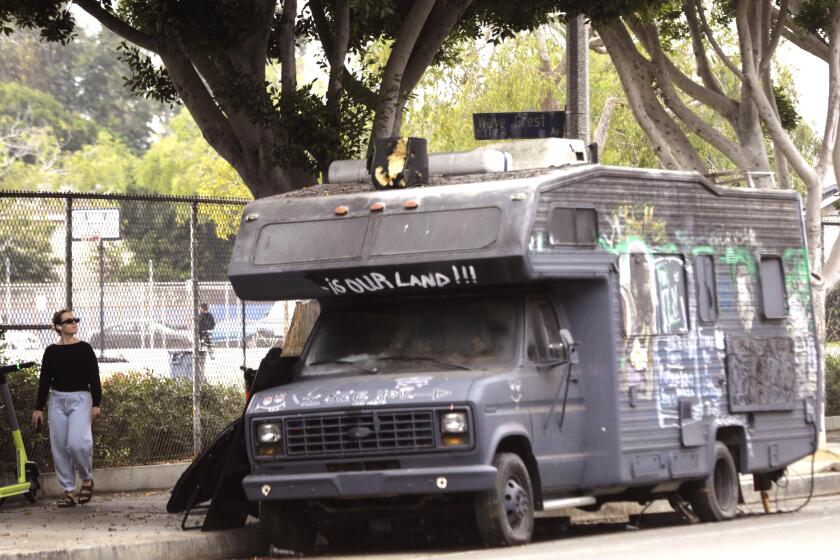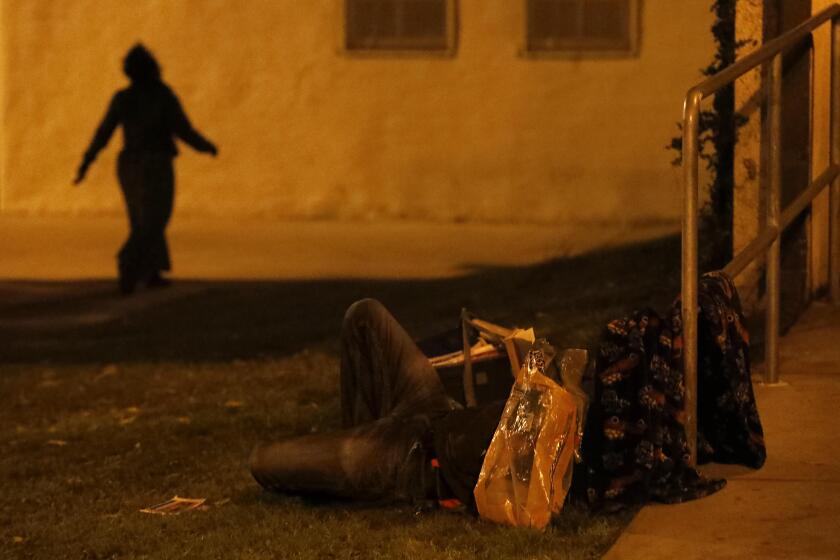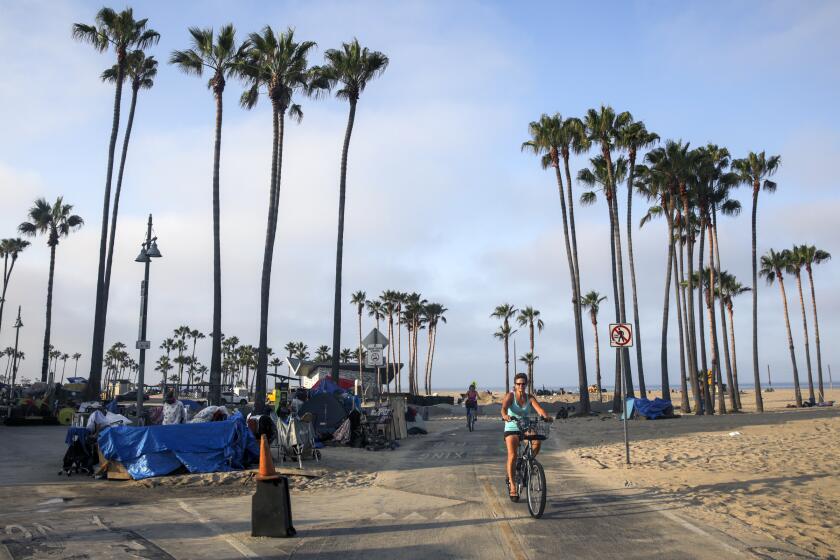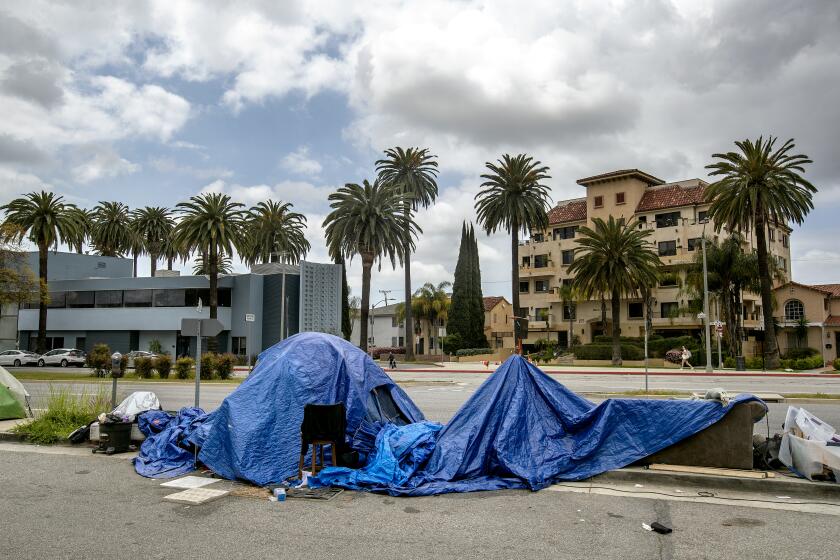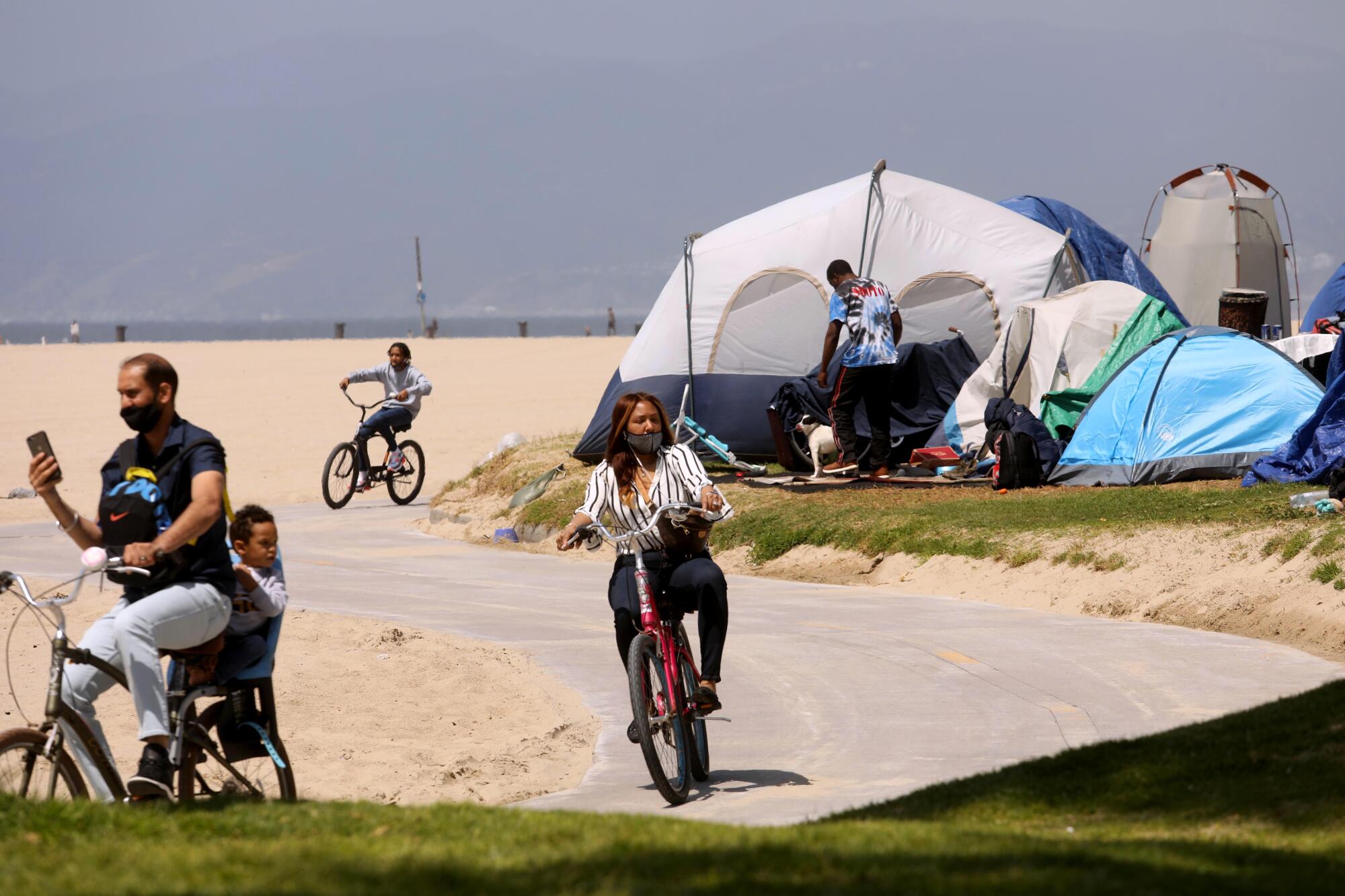
- Share via
How many times have you heard successful people talking about the obstacles they overcame, the discouraging chapters they endured, the “rock bottom” from which they rose up? Maybe you see your own life in similar terms. It’s a particular narrative that ends with success, and anyone who has lived it would tend to think other people’s lives can, with work, conform to this arc. We need to get away from that assumption. Some people’s lives aren’t on an upward trajectory and may never be, and those people also deserve respect and dignity.
A majority of unhoused people in Los Angeles County live in cars, trucks or RVs. Some of them have income, just not enough to afford both rent and food.
Early this month I met with three of my unhoused neighbors in Venice, one who has been on and off the street for 20 years, one who has autism, and one whose life was upended by a toxic relationship. They agreed to share their stories with The Times on condition that their last names not be used.
Three unhoused women who live in Venice say they have learned to protect themselves, in body and spirit.
Governments and nonprofits pour untold sums into caring for the unhoused through myriad programs, but in speaking with unhoused people, I often hear that their needs are not very complex. Even a modest monthly check would be transformative to the lives of many. What if a big piece of the solution to homelessness were simply a universal basic income? — Robert Karron
Brandon
My name is Brandon, and I’m 37 years old. I grew up in Lancaster, in the Antelope Valley. I was 9½ weeks premature — only a bit over 3 pounds. I’ve made up for it since then. But my first year of life I had lots of seizures.
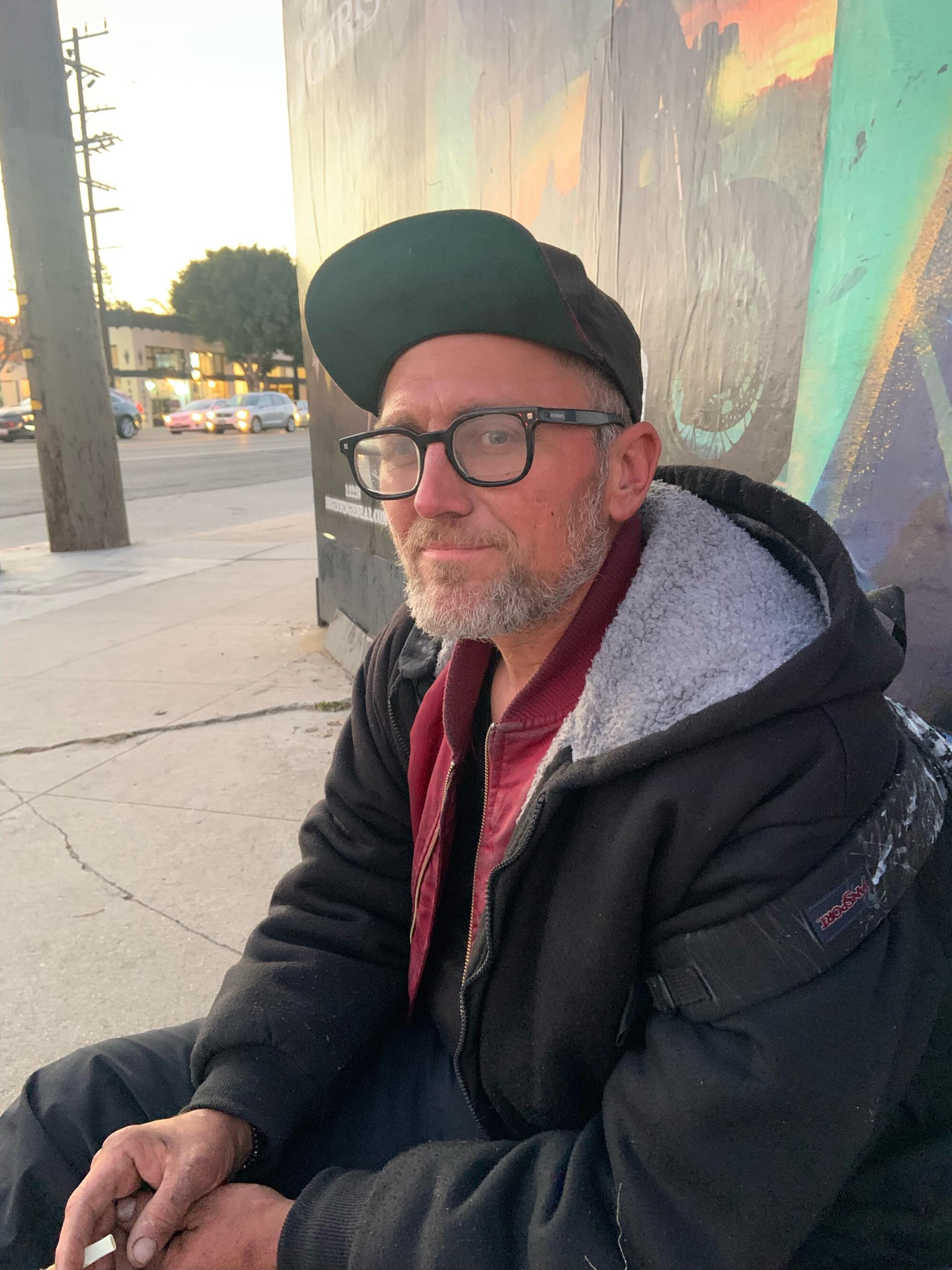
I graduated from high school early, when I was 15. I did independent study, because school was becoming increasingly strange. There was violence and gang activity. Kids would get kicked out of L.A. County, then transfer to ours, in Kern County. I remember one kid shot and killed another in the eighth grade. They knew each other from L.A., and they had a beef from then. It happened in front of my math teacher’s house. For years, you could see the bullet holes in the wall. That kid was tried as an adult and got two life sentences. It’s like the school was a training camp for jail.
It was also a racial political zone. I celebrate Hanukkah, and there was a group of kids that chose to call me names. I put myself out there, telling people I celebrated — I didn’t have to do that. But I didn’t realize it was going to be something that would be detrimental to my social well-being.
Three men recount their family ties, their romances, how they came to live on the street and how they make ends meet.
So I took classes at home. It was good because I could go at my own pace, but it was bad because I got too familiar with my parents; we could have used more distance. I didn’t get along with my mom, and we clashed.
After high school, I thought I’d go to the Marines — my grandfather was a decorated war hero — and they accepted me into the deferred entry program, but they found marijuana in my drug test, so that didn’t work out. I was exposed to drugs early; it was rampant at my high school. You were pressured to take them because the kids who were selling were depending on it for their livelihood; in their families, they were the earners. It seemed glamorous then, but I don’t see any glamour in it now.
I just use these blankets. It’s not enough, but people steal so frequently, it’s hard to keep stuff.
— Brandon
I started working for an insurance company, and I stayed for seven years. I was also taking college classes at Antelope Valley College, music classes, my passion. I didn’t think of music practice as “practice,” because when you’re getting so much pleasure out of something, “practice” isn’t in your mind-set. But when the money started coming in, I let all that slide.
I had lots of jobs within the company, but mainly I was a patient service associate. By the time I was 17, I had my own apartment; my parents helped me furnish it, super sweet of them, but I wasn’t ready for that kind of responsibility. Even though I was making money, it was a miserable existence. It was a dark period for me. I kept feeling empty at the end of each day. I didn’t understand why I had this unfulfilled feeling. My father had a face of fulfillment after a day’s work. Why didn’t I? I wanted to achieve that but didn’t know how.
Andromeda, Erica and Heidi have gotten by for years on the street. Sometimes government helps them, but at other times it makes their lives harder.
At 18, I fell in love with a woman who was 22 years older than me. I was with her for seven years. She was an amazing artist. Eventually I quit my job and worked as a butler for her friends. When I left her, I sought therapy, because I’d lost my grip on society. I tried to get into music then, but there weren’t many opportunities.
I’ve been on and off the streets for 20 years. I just use these blankets. It’s not enough, but people steal so frequently, it’s hard to keep stuff. I’d like to get my own space, but I’m not sure how. I’m putting one foot in front of the other. It’s hard because I have a stomach bug and all these wounds on my leg and hand that never heal. They’re in a constant state of infection.
Garrick
My name is Garrick, and I’m 56 years old. I’ve been in L.A. for nine months. Before that I was in New York City for 11 years (128 months). I’m scheduled to move again 39 days from now, on Tuesday, Feb. 20, and I need to find a place where I can spend the day before — from 8 in the morning till 8 at night — getting cleaned up. I don’t know where that will happen. Do you have any ideas? Is there a gymnasium in L.A. that has army cots and a big bathroom with showers and sinks and commodes where you can go and leave anytime you want as long as you sign your name? I’m asking because I’ve never heard of such a thing.
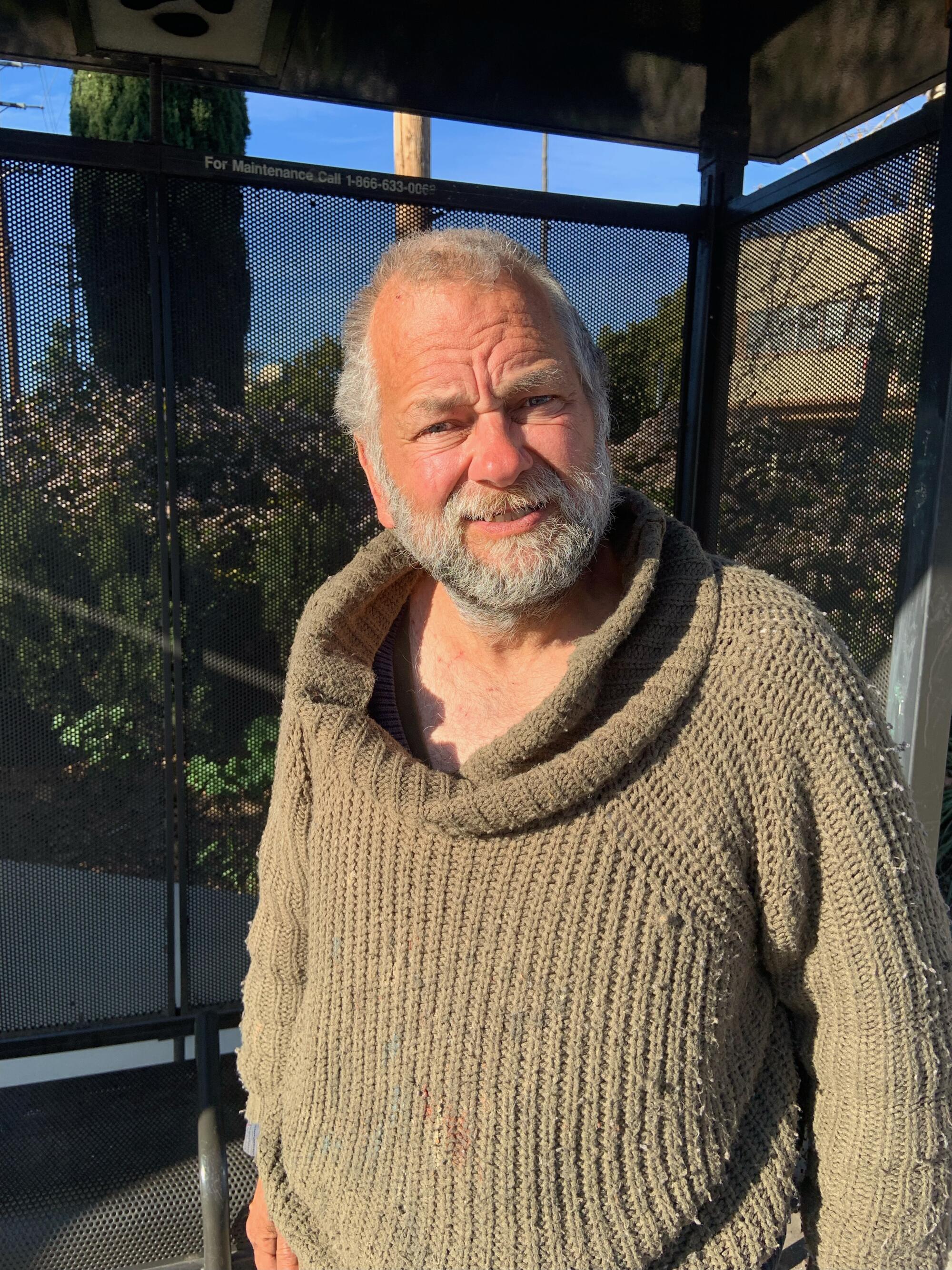
I’m moving to Boston, but I need someone’s smart device to check Greyhound for the bus that makes stops in Phoenix, El Paso, Dallas, Atlanta, Washington, D.C., and three stops in South Carolina: Anderson, Greenville and Spartanburg. Then I need to see what time the bus arrives in Boston. If I know the time, I can plan out my first day.
I’m moving because Boston has everything I need. In L.A. I’m laying on the sidewalk with chiggers. It’s better than New York by a long margin, but in Boston I’ll have better prospects because I know the neighborhoods and resources and trains and shopping centers. I lived there for four months, before moving to New York. In between, I was in Providence, for two days and two nights.
Like so many of L.A.’s 41,980 unhoused residents, Patrick, Shane and Crystal were on a different path until things fell apart.
There are a lot of variables when you come from a broken home, and you have high-functioning autism, and your stepfather was drafted in the Vietnam War and was an authoritarian figure who moved you and your mother to Ohio.
My mother and I identify with each other and idolize each other. We could always work things out, if it was just the two of us. But that went down the toilet when my mother let people deter things between us, when they talked a line to her. When she was manipulated, things went in different directions.
Jobs? If you have high-functioning autism, you can’t hold a job.
— Garrick
I like heavy music, specifically the songs from the summer and fall of 1972 and the winter, spring, summer and fall of 1973. The utmost prime example of that is music by Led Zeppelin — by a long margin, my favorite singing group. What I’d like for after my bus trip is a CD player without earphones (those always make the player fall apart) that operates on batteries. I can pay for the batteries. Then I need a CD with every song Led Zeppelin ever sang.
Jobs? If you have high-functioning autism, you can’t hold a job.
I have three main sleeping spots. One of them is here. Last night it dipped down to 46 and 47 degrees. To keep warm I use linens I stash behind those bushes.
Cynthia
My name is Cynthia, and I’m 59 years old. I was born in Ohio but raised in Wisconsin. I completed junior high, but at 15 I quit school because I got pregnant. The father was a family friend in his 20s who my mother had asked to watch us when she took classes to become a certified nursing assistant. He ended things when he found out I was pregnant.
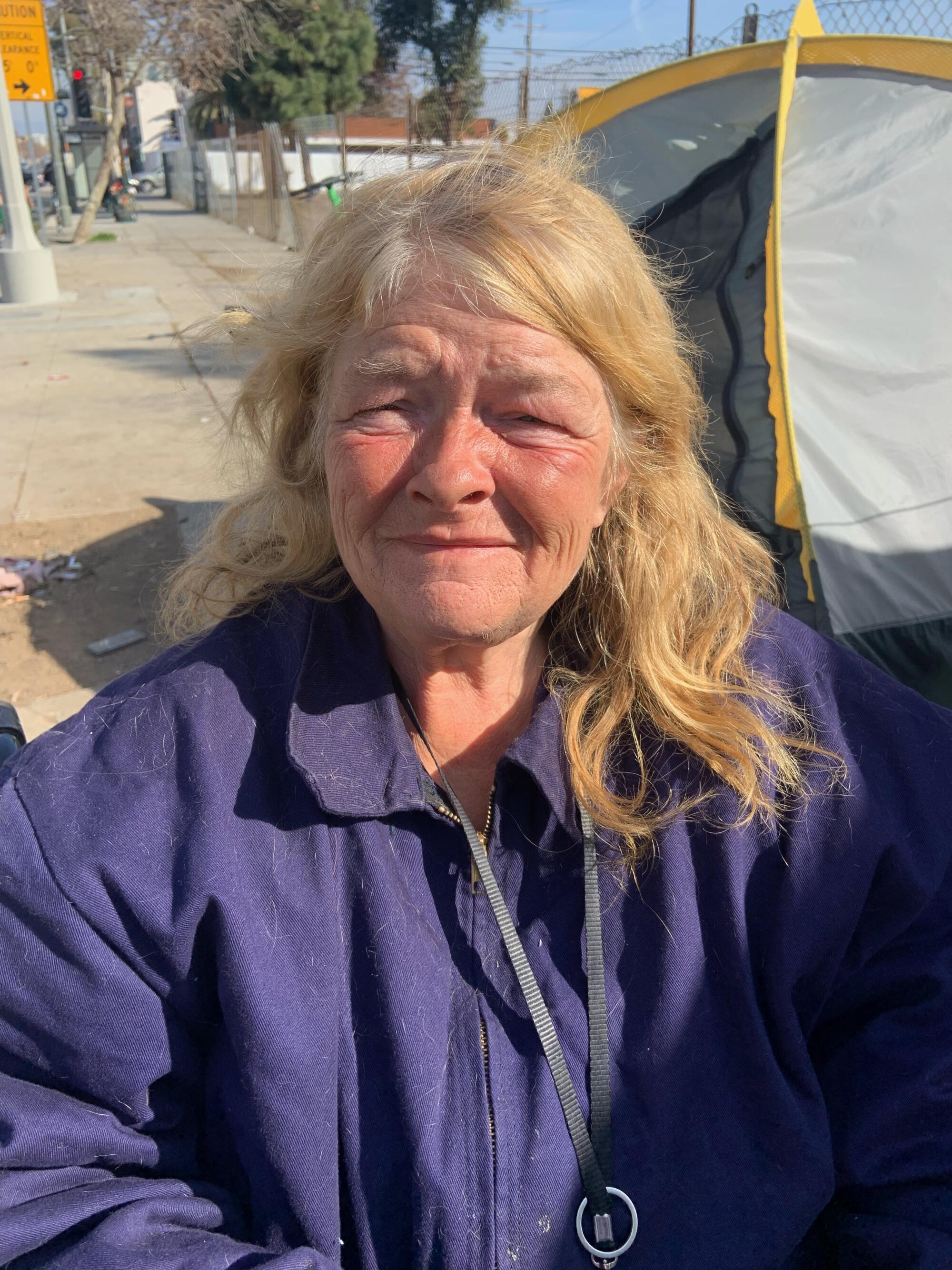
By 17 I was having problems with depression, and the state took my daughter away. It’d be illegal now: They threatened to cut off my mother’s welfare checks if I didn’t sign the papers. I got pregnant again at 21 and have a son who loves me to death; he’s in Kentucky now with his dad, my ex-fiance. We were going to get married, but he wanted me to live in his mother’s house for a year; I said no and moved back in with my mom. He came to get the engagement rings. That made me mad, so I threw them into the front yard. He searched for two hours but eventually found them.
Jermaine, Jason and John all landed on the streets when they were squeezed between high housing costs and low incomes. What could have kept them in their homes?
I went back to school and got my GED. I was taking college business courses, but the man I was married to then couldn’t hold a job, so I quit and started working at a company that sent out cheese and candy packages.
Later I was engaged to someone who moved me to Minneapolis, where I worked at a Greek restaurant. When I found him in bed with another man, I had to find another place to stay. The owner of the restaurant, who liked me, was going to put me up, but his wife got jealous. So I had to move back home again.
I met my boyfriend Greg. We got to talking, and by nighttime he was cuddled up next to me.
— Cynthia
When I was living at home, I began a 10-year relationship with someone I saw a few times a year. He said he was in the armed services and was always traveling. After 10 years I was 53, and he asked me to move in with him in Los Angeles. I’m two hours on the bus when I call him. He says he’s in trouble and needs $500. I say I don’t have it. He says, get it any way you can. When I couldn’t get it, he stopped taking my calls. I took the bus to Union Station in Pasadena, where they help you find a place — but soon I was on the streets.
I was protected by this great guy called Tennessee (he was from Tennessee), and two weeks later, I met my boyfriend, Greg. We got to talking, and by nighttime he was cuddled up next to me. Tennessee gave him a blanket, but at midnight I told him to leave — it was going too fast. But it all worked out. We’ve been together 5½ years, and we’re going to get married after we move in together.
Robert Karron teaches English at Santa Monica College.
More to Read
A cure for the common opinion
Get thought-provoking perspectives with our weekly newsletter.
You may occasionally receive promotional content from the Los Angeles Times.
